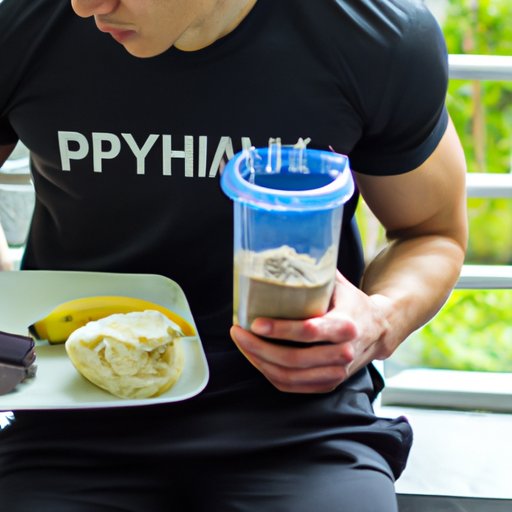Introduction
Working out is an important part of staying healthy and fit. Whether you’re an athlete, an avid gym-goer, or someone just trying to stay active, understanding when and what to eat before and after exercise can be crucial for maximizing results. Eating the right foods at the right times can help improve energy levels, reduce fatigue, and enhance muscle growth and recovery.

Identifying the Optimal Time to Eat Before or After Exercise
When it comes to deciding whether to eat before or after exercise, there are several factors to consider. For example, how much time do you have before or after your workout? How intense will the workout be? What type of food should you eat? What are the benefits of eating before or after exercise?
In general, if you’re going to be exercising for less than an hour, it’s generally recommended to eat a light snack or meal about 30 minutes to an hour before your workout. This will provide your body with enough energy to get through the workout and help prevent fatigue. For longer or more intense workouts, it’s best to eat a larger meal about two to three hours before the workout.
After exercise, it’s important to replenish lost energy and nutrients. Eating a small snack or meal within 30 minutes of finishing your workout is ideal. This will help your body recover and prepare for your next session.

What Science Says About Eating Before and After Exercise
Studies have shown that eating before and after exercise can have a positive impact on performance and overall health. In one study, athletes who ate a carbohydrate-rich meal three hours prior to exercise were able to perform better and felt less fatigue during their workout compared to those who didn’t eat before exercising.
In another study, researchers found that consuming carbohydrates and protein immediately after exercise can help speed up recovery and reduce muscle soreness. They also found that consuming carbohydrates and protein before exercise can increase muscle glycogen stores and improve endurance.
The Nutritional Benefits of Eating Before and After Exercise
To maximize the benefits of eating before and after exercise, it’s important to focus on consuming the right types of foods. Macronutrients such as carbohydrates, proteins, and fats are essential for providing energy and helping the body recover. Additionally, micronutrients such as vitamins and minerals are important for optimizing performance and promoting overall health.
Timing is also important when it comes to eating before and after exercise. Eating too close to your workout can lead to gastrointestinal distress, while eating too far away can leave you feeling sluggish and under-fueled. Generally, it’s best to aim to eat a meal or snack two to three hours before exercise and within 30 minutes of finishing your workout.
Meal Planning for Pre- and Post-Exercise Nutrition
When planning meals for before and after exercise, it’s important to make sure they contain the right types of nutrients. For pre-exercise meals, focus on consuming complex carbohydrates, lean proteins, and healthy fats. Examples include oatmeal with nuts and fruit, Greek yogurt with berries, or a turkey sandwich on whole wheat bread.
For post-exercise meals, focus on consuming carbohydrates and proteins in a 4:1 ratio. Examples include a smoothie made with banana, almond milk, and protein powder, a bowl of brown rice with grilled chicken and vegetables, or a turkey wrap with hummus and spinach.

Strategies for Fueling Your Workout with Food
In addition to meals and snacks, there are other strategies you can use to fuel your workout. Hydration is important for keeping your body cool and preventing dehydration. Make sure to drink plenty of water throughout the day and during your workout.
Supplements can also be useful for providing extra energy and nutrients. Common supplements for exercise include caffeine, creatine, and branch chain amino acids. However, it’s important to talk to your doctor before taking any supplements to make sure they’re safe for you.
Finally, it’s important to pay attention to your calorie intake. Consuming too many calories can lead to weight gain, while not consuming enough can lead to fatigue and poor performance. Aim to consume the right amount of calories for your activity level and goals.
Conclusion
Eating before or after a workout can have a significant impact on your performance. Understanding the pros and cons of eating before vs. after exercise, as well as the right types of foods and timing of consumption, can help ensure you’re getting the most out of your workouts. Meal planning and hydration are also important for fueling your workouts and promoting overall health.
By following these simple tips, you can make sure your body is adequately fueled and ready to take on whatever physical challenges come your way.
(Note: Is this article not meeting your expectations? Do you have knowledge or insights to share? Unlock new opportunities and expand your reach by joining our authors team. Click Registration to join us and share your expertise with our readers.)
